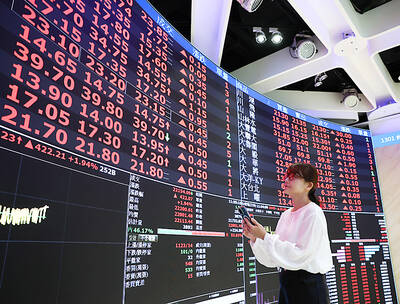Can an obscure Asian brand turn into a top global handset vendor overnight, by buying into an industrial titan? That's the wager BenQ Corp (
The high-profile purchase marked the beginning of another adventure for BenQ Chairman Lee Kun-yao (
In the past three years, BenQ has begun to win global attention with its innovative product design. But its weak brand awareness among consumers has been little help to sales.

PHOTO: AFP
Even on its home turf, BenQ is losing market share to rival Inventec Appliances Corp (
To sharpen its brand operation, BenQ decided to take a shortcut to the global mass market when opportunity knocked, following in the ambitious footsteps of Chinese electronics vendors Lenovo Group Ltd (
"We hope the BenQ-Siemens brand will bring BenQ to the world," said Lee, during the press conference announcing the take-over last Tuesday.
Analysts said BenQ could risk seeing weakening profitability with the deal.
"BenQ is getting paid for taking a risk," said Vincent Chen (
"With the experience of Lenovo and TCL a reminder of the difficulties in turning around weak western brands, we are very cautious about what BenQ can achieve with Siemens," Chen said.
According to the agreement with Siemens, BenQ will sell cell phones under the co-brand BenQ-Siemens over the next-five-year period after the cost-free take-over of Siemens' handset division headquartered in Munich, which takes effect October 1.
Siemens will give the Taiwanese company 250 million euros to help fund the unit's operations, and will spend another 50 million euros to get a 2.5-percent share of BenQ. Siemens is expected to regain investor support by disposing of the money-losing unit. The short-term reaction to the deal was good: shares of Siemens jumped to 62.94 euros, their highest level since January, in the mid-day session after the announcement in Frankfurt.
But for BenQ investors, a real concern is whether the inexperienced company will be able to succeed where the veteran German electronics company could not, by transforming Siemens' money-losing handset unit into a cash cow.
Siemens' troubled mobile phone division posted its fourth consecutive quarterly loss in the first quarter of this year, with little sign of improvement ahead. The division has lost 500 million euros over the past year.
That doesn't seem to faze Lee, who with a confident smile told reporters in Beijing last Wednesday that his company aimed to turn around the new handset operation in two years, after breaking even next year.
Lee's promise sounded unrealistic to most industry watchers, who said it would be an uphill task for a small Asian company like BenQ to save a Western giant that's on the wane.
BenQ will have to overcome difficulties similar to those faced by Lenovo and TCL, CLSA's Chen warned.
Those difficulties include safeguarding Siemens' falling market share and trimming operating expenses and manufacturing costs, Chen said. BenQ said it hopes to trim US$500 million in costs in the first year of the acquisition.
Siemens is handing over about 6,000 workers of the handset operation to BenQ, which has around 14,000 employees around the globe.
Chen expects BenQ to start booking losses in the third quarter of next year and possibly into 2007.
JP Morgan analyst Johnny Chan shared the same worries with Chen, citing China's TCL Group as a precedent. TCL Multimedia and TCL Communications acquired the loss-making French handset businesses Thomson and Alcatel. Both found it far more difficult than expected to turn around the businesses due to competition and slower progress in cutting costs, Chan said in the latest report.
"Both stocks have seen significant de-rating in the past six months. We suspect BenQ's share price could follow a similar pattern in the next 12-18 months," Chan said.
Chan said he would revise his earnings forecasts to reflect the acquisition in due course. BenQ remains on the "Short" side of JP Morgan's Asia Pacific Tech Trading Portfolio with a target price of NT$27 for 2005, he said.
Despite the pessimistic consensus from analysts, International Data Corp (IDC) said there were some positive aspects of the BenQ-Siemens deal.
"The purchase of Siemens' handset unit will help BenQ expand its brand presence in Europe and Latin America, where Siemens has grabbed a solid market position, as BenQ only has a strong customer base in Asia," said Terry Tsao (
With Siemens' market position and BenQ's strong manufacturing capabilities and cost control, Tsao believes BenQ has a good chance to become one of the world's top handset vendors.
Indeed, it is too early to decide now to where the acquisition, rife with uncertainties, will lead BenQ. But as Tsao concluded, one thing's for sure: established European and US players are facing mounting competition from rising Asian stars.

UNCERTAINTIES: Exports surged 34.1% and private investment grew 7.03% to outpace expectations in the first half, although US tariffs could stall momentum The Chung-Hua Institution for Economic Research (CIER, 中華經濟研究院) yesterday raised its GDP growth forecast to 3.05 percent this year on a robust first-half performance, but warned that US tariff threats and external uncertainty could stall momentum in the second half of the year. “The first half proved exceptionally strong, allowing room for optimism,” CIER president Lien Hsien-ming (連賢明) said. “But the growth momentum may slow moving forward due to US tariffs.” The tariff threat poses definite downside risks, although the scale of the impact remains unclear given the unpredictability of US President Donald Trump’s policies, Lien said. Despite the headwinds, Taiwan is likely

READY TO BUY: Shortly after Nvidia announced the approval, Chinese firms scrambled to order the H20 GPUs, which the company must send to the US government for approval Nvidia Corp chief executive officer Jensen Huang (黃仁勳) late on Monday said the technology giant has won approval from US President Donald Trump’s administration to sell its advanced H20 graphics processing units (GPUs) used to develop artificial intelligence (AI) to China. The news came in a company blog post late on Monday and Huang also spoke about the coup on China’s state-run China Global Television Network in remarks shown on X. “The US government has assured Nvidia that licenses will be granted, and Nvidia hopes to start deliveries soon,” the post said. “Today, I’m announcing that the US government has approved for us

When Lika Megreladze was a child, life in her native western Georgian region of Guria revolved around tea. Her mother worked for decades as a scientist at the Soviet Union’s Institute of Tea and Subtropical Crops in the village of Anaseuli, Georgia, perfecting cultivation methods for a Georgian tea industry that supplied the bulk of the vast communist state’s brews. “When I was a child, this was only my mum’s workplace. Only later I realized that it was something big,” she said. Now, the institute lies abandoned. Yellowed papers are strewn around its decaying corridors, and a statue of Soviet founder Vladimir Lenin

The National Stabilization Fund (NSF, 國安基金) is to continue supporting local shares, as uncertainties in international politics and the economy could affect Taiwanese industries’ global deployment and corporate profits, as well as affect stock movement and investor confidence, the Ministry of Finance said in a statement yesterday. The NT$500 billion (US$17.1 billion) fund would remain active in the stock market as the US’ tariff measures have not yet been fully finalized, which would drive international capital flows and global supply chain restructuring, the ministry said after the a meeting of the fund’s steering committee. Along with ongoing geopolitical risks and an unfavorable